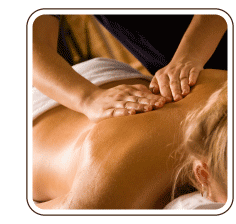|
Your massage therapist will require you to fill out a health history form. Afterwards
Most people feel very relaxed after a massage appointment. Some experience freedom from long-term aches and pains developed from tension or repetitive activity. After an initial period of feeling slowed down, people often experience increased energy, heightened awareness, and greater productivity which can last for days. Since toxins are released from your soft tissues during a massage, it is recommended you drink plenty of water following your massage. Massage therapists sometimes recommend a hot Epsom salt bath that encourages the release of toxins that may have been stirred up from the massage treatment.
Make yourself comfortable during your massage appointment. If your therapist wants you to adjust your position, she or he will either move you or will ask you to move what is needed. Otherwise, change your position anytime to make yourself more comfortable. Many people close their eyes and relax completely during a session; others prefer to talk. It's up to you. It is your massage and you will be able to relax best if you do what feels natural to you. Do not hesitate to ask questions at any time.
The average full body massage treatment lasts approximately one hour. A half-hour appointment only allows time for a partial massage session, such as neck and shoulders, back, or legs and feet. Many people prefer a 60 to 90 minute session for optimal relaxation. Always allow relaxation time prior to and after your massage session whenever possible.
Patients commonly have massage treatments for general relaxation and well-being, or to address a specific complaint, such as pain or limited range of motion. Research suggests massage therapy may contribute to both goals. Some of the general benefits of massage therapy may include:
Depending on the primary technique your therapist uses, you may or may not need to undress. For a full body massage, most people undress completely. However, you may choose to wear underwear. It is entirely up to you and your personal comfort. Your massage therapist will give you privacy to undress and, at all times, your body will be fully draped with a sheet and blanket except for the area being worked on.
Massage Therapy can decrease pain; provide pyschological, emotional and physical benefits; and help treat, manage, and increase functioning for the following conditions:
Most massage therapists use hypoallergenic massage oils or lotions. However, if you have sensitivity to certain types of oils or lotion please bring it to the massage therapist's attention as most practitioners have an assortment of oils and lotions on hand.
No, there are several medical conditions that would make massage inappropriate. That's why it is necessary that you fill out the health history forms before you begin your session. The massage therapist will ask general health questions to find out if you have any contraindications to massage. It is very important that you inform the practitioner of any health problems or medications you are taking. If you are under a doctor's care, it is strongly advised that you receive a written recommendation for massage prior to any session. Your massage therapist may require a recommendation or approval from your doctor.
It usually depends on the techniques used. Many massage therapists use a form of Swedish massage, which is often a baseline for practitioners. In a general Swedish massage, your session may start with broad, flowing strokes (effleurage) that will help calm your nervous system and relax exterior muscle tension. As your body becomes relaxed, pressure will gradually be increased to relax specific areas and relieve areas of muscular tension. Often, a light oil or lotion is used to allow your muscles to be massaged without causing excessive friction to the skin. Do not hesitate to ask questions or mention if you feel any discomfort so that the massage therapist can use another approach or technique.
You might think massage parlors that offer sensual or erotic massage will look obviously seedy and easy to spot, this is not always the case.
At i spa, all of our practitioners are licensed, accredited professionals who will display the highest level of professionalism during your appointments. |



 the therapist will begin by asking you general questions to establish what areas you would like worked on, if there are any conditions needing to be addressed and to determine if massage is appropriate for you. Your massage therapist may perform certain assessments and testing to evaluate your condition, and to see if you have any presenting complaints.
the therapist will begin by asking you general questions to establish what areas you would like worked on, if there are any conditions needing to be addressed and to determine if massage is appropriate for you. Your massage therapist may perform certain assessments and testing to evaluate your condition, and to see if you have any presenting complaints.